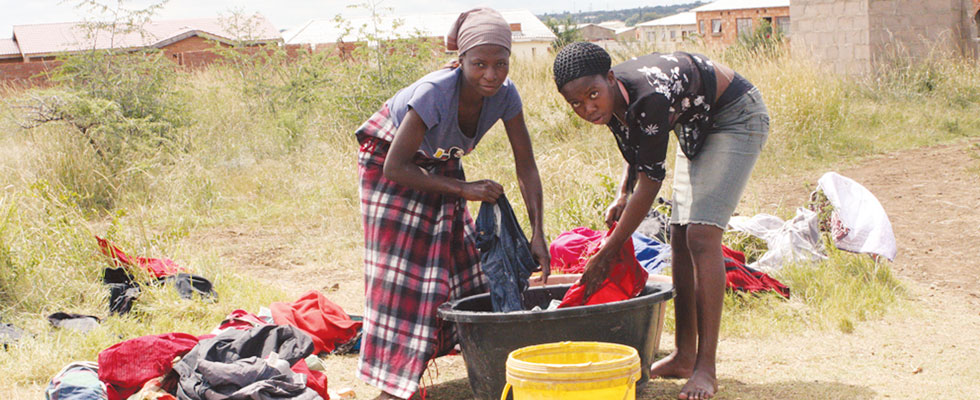
It is just before 6 o’clock in the morning. A motley group of women with empty 25-litre containers brave the dawn chill in Zengeza 3 as they wait for the gate to be opened.
Report by Phillip Chidavaenzi
Finally, about 15 minutes later, the maid at the house opens the gate and they all walk in, heading for the borehole at the corner of the yard.
They take turns to fill in their tins as they chat about the daily challenges they face — power outages and critical water shortages.

One by one, after filling their containers, they troop back to their different homes.
“This is a routine we have become used to every day,” said one of the women, Samantha Makwarimba.
“We live on the charity of our neighbours who have boreholes. We only access tap water one day, or at most twice, a week.”
Her colleague, Mildred Marowa (32), said the water was used for drinking and household chores such as cleaning and laundry.
- Chamisa under fire over US$120K donation
- Mavhunga puts DeMbare into Chibuku quarterfinals
- Pension funds bet on Cabora Bassa oilfields
- Councils defy govt fire tender directive
Keep Reading
She said a few months ago, they used to walk a long distance in search of borehole water, but the burden had now eased since several of her neighbours now had boreholes drilled on their premises and were not stingy with the precious liquid.
Out of the desperation spawned by the water shortages that have become the bane of most urban councils, some Chitungwiza and Harare residents have resorted to drilling boreholes and side-step the water woes.

In the dormitory town, 27km out of Harare and high-density suburbs such as Glen View and Budiriro, some hitherto unemployed youths have found a source of income through drilling boreholes for interested residents at a cost of between $150 and $250.
Just like in Chitungwiza, residents of Budiriro and Glen View said they had been left with no choice, but to get their own sources because their municipalities had no capacity to supply them with adequate potable water.
“Our taps have been dry for a long time now. Wells are the only solution. Some people are even selling water,” said Getrude Chiriseri from Budiriro.
Harare Municipality produces 620 megalitres of water against a demand of 1 200 megalitres a day and has to supply its dormitory town, Chitungwiza.
Concern has also been raised over the safety of the water, which is treated by several chemicals and has to pass through antiquated pipes to residents.
An official at Chitungwiza Town Council said unless the town has its own dam from which to draw water, the problem was likely to persist. He said while his council required 45 megalitres of water a day, Harare only supplied 30 megalitres.
“At least borehole water is safer,” said Makwarimba.
“At least we can trust it than the water we get from the tap. We boil all the water we get from the tap — that is when it is available — before drinking it.”
However, what is unknown to Makwarimba and others now relying on self-drilled borehole water is that the water may not be as safe as they assume.
This alarm bell was sounded by Chitungwiza town clerk George Makunde, who said: “We don’t normally encourage people to drill boreholes. The water table is high so the chances that the water could be contaminated are also high. Drilling boreholes is also a misnomer, but because of the water problems, we just encourage people to make sure that the water (from boreholes) is used for other things and not drinking.”
Although in Harare, in the past, northern suburbs such as Greendale, Mandara and Glen Lorne where the hardest hit by water challenges, forcing residents to drill boreholes, the problem has spread to the populous western and southern suburbs.
The city authorities, however, have found it almost impossible to fine people drilling boreholes without their authorisation as provided for in council by-laws.
“It would look as if the council has turned a blind eye to the situation, but it is powerless to take action. Well drilling needs to be certified by council to ensure that the well is properly sited and does not deprive other residents of underground water. Residents who dig wells and sink boreholes without council approval are supposed to be fined,” said Prosper Chonzi, Harare city health director.
A recent tour of the water bottling facility of Mukati Investments, both of which use borehole water, debunked the notion held by many that borehole water is safe after revelations about how it is purified before being bottled for consumption. The water, which would have been sourced from boreholes, goes through multiple-stage purification processes where one could clearly see dirt being extracted before it is bottled.
Several municipalities in the country have for many years been struggling to supply adequate and clean drinking water to residents, with the population explosion in urban areas distressing obsolete infrastructure.
Researcher and water expert Christopher Magadza told journalists during a wetlands media tour held in December last year that due to loss of wetlands in Harare, the water being supplied to the city had 50% recycled urine.
“For every glass, you have 50% water and 50% treated urine, which again is not being treated so well. We will have so many troubles — excluding cholera and typhoid — and an increase in liver cancer! Imagine what 11 chemicals will do to your stomach?” he said.














